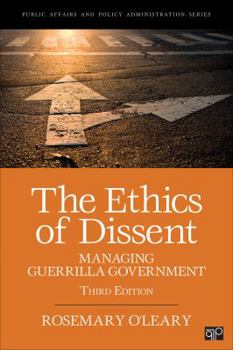The Ethics of Dissent: Managing Guerrilla Government
From "constructive contributors"" to "deviant destroyers," government guerrillas work clandestinely against the best wishes of their superiors. These public servants are dissatisfied with the actions of the organizations for which they work, but often choose not to go public with their concerns. In her Third Edition of The Ethics of Dissent, Rosemary O'Leary shows that the majority of guerrilla government cases are the manifestation of inevitable tensions between bureaucracy and democracy, which yield immense ethical and organizational challenges that all public managers must learn to navigate.
Format:Paperback
Language:English
ISBN:1506346359
ISBN13:9781506346359
Release Date:March 2019
Publisher:CQ Press
Length:216 Pages
Weight:0.70 lbs.
Dimensions:0.5" x 6.0" x 9.0"
Customer Reviews
3 ratings
Twenty years in the making and worth it!
Published by Thriftbooks.com User , 15 years ago
A famous author once said that all books are either works of love or demons that drove their authors to write them. This book is clearly an act of love. The topic is very timely. As America gears up for change, there will be some government personnel that are caught between their ideals of what they feel they should do and the demands of what their job and their chain of command require them to do. The book does a great job at laying out the big picture on what is guerilla government and then following up on how to handle both sides of it, i.e., being a guerilla or managing guerilla employees. Table 5.2, the characteristics of a guerilla in the government ranks, is worth the price of the book alone. This book is a must read for all government managers or those interested in government affairs. In service, Rich
Not a Bad Read.
Published by Thriftbooks.com User , 18 years ago
I got this book cuz my grad professor had it on his reading list. Although some of the reading at te beginning of the book was hard to follow, later readings were actually easy to digest. I thought the author presented an important topic in government that really hasn't been explored much. I think she may be a little biased towards the guerrillas - however, in most of the cases she presented, I think you'll find it reasonable to see why. Even if you are not in this field at all, but want to understand more of what goes on in the background of policy - namely, by the "little guy," then I think anyone will enjoy the topics O'Leary presents for your ponder. But I wouldn't take her suggestions at the end of the book, on how to "manage" guerrilas, as the sure-fire soultions.
Administrative Discretion and Guerrilla Government
Published by Thriftbooks.com User , 18 years ago
Review by H. George Frederickson, Distinguished Professor, University of Kansas, published in PA TIMES, February, 2006, page 11 Sixty-five years ago Herman Finer and Carl Friedrich framed one of the classic debates in public administration-Finer arguing that democracy is dependent on tight legalistic controls over bureaucracy, Friedrich countering that effective administration requires bureaucratic expertise and the discretion to apply that expertise. Over the years public administrators have inclined rather strongly in the direction of Friedrich's position, favoring granting a broad range of discretion to bureaucrats. These days the positions of Finer and Friedrich tend to be debated in terms of multiple forms of accountability: accountability to elected officials, the constitution and the laws, one's public service profession, the greater good, one's conscience-and public administrators still favor Friedrich's position believing they should have the discretion to make tough choices and to be held accountable for those choices. This week a vivid description of the extremes of the long-standing debate over what ought to be the proper range of administrative discretion has reached my desk; Rosemary O'Leary's splendid new book The Ethics of Dissent: Managing Guerrilla Government (Washington, D. C.: CQ Press, 2006). Although the title, The Ethics of Dissent, is lofty and grand, it is the subtitle, Managing Guerrilla Government, that best describes what the book is all about. Guerrilla government is O'Leary's term for "the actions of career public servants who work against the wishes-either implicitly or explicitly communicated-of their superiors. Guerrilla government is a form of dissent typically carried out by those who are dissatisfied with the actions of public organizations, programs, or people but who typically, for strategic reasons, choose not to go public with their concerns. . ." (p. xi). Based on more than three dozen actual cases-the cases are mostly rather brief first-person accounts and stories-which include the names of the guerrillas, what they did, and how they did it, O'Leary provides a powerful and very readable empirical base for her findings and generalizations. O'Leary's guerrillas include Mark Felt, the "Deep Throat" of Watergate fame and Chiune Sugihara, the Japanese diplomat stationed in Lithuania, who, in the summer of 1940, against the policies of the Japanese government, issued visas to over 10,000 Jews, enabling them to escape the Holocaust. Unlike Felt and Sugihara and other high-profile guerrillas, most of O'Leary's guerrillas are garden variety nameless and faceless civil servants. There are more bureaucratic guerrillas than one might think, and guerrilla warfare in the bureaucratic trenches is far more common than one might think. Indeed, "guerrilla government happens all the time in the everyday, often mundane world of bureaucracy. Sometimes guerrillas fail to correct superiors' mistakes and le






